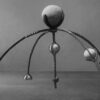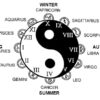Maria Medina-Schechter (born Pasadena, California, 1976), is a bio artist whose work is informed by the natural world, including Middle Age illuminated manuscripts, scribes, and recipes. She is inspired by Hildegard of Bingen, a German mystic of the High Middle Ages. Maria works primarily with bio materials, mycelium, tree resin, and foraged botanical materials. Her early work involved the use of living organisms, such as bacteria and fungi, as art materials, creating sculptures and installations that were alive and growing. In the 1990s, she began to integrate digital technologies into her work, exploring the relationship between virtual and organic.








